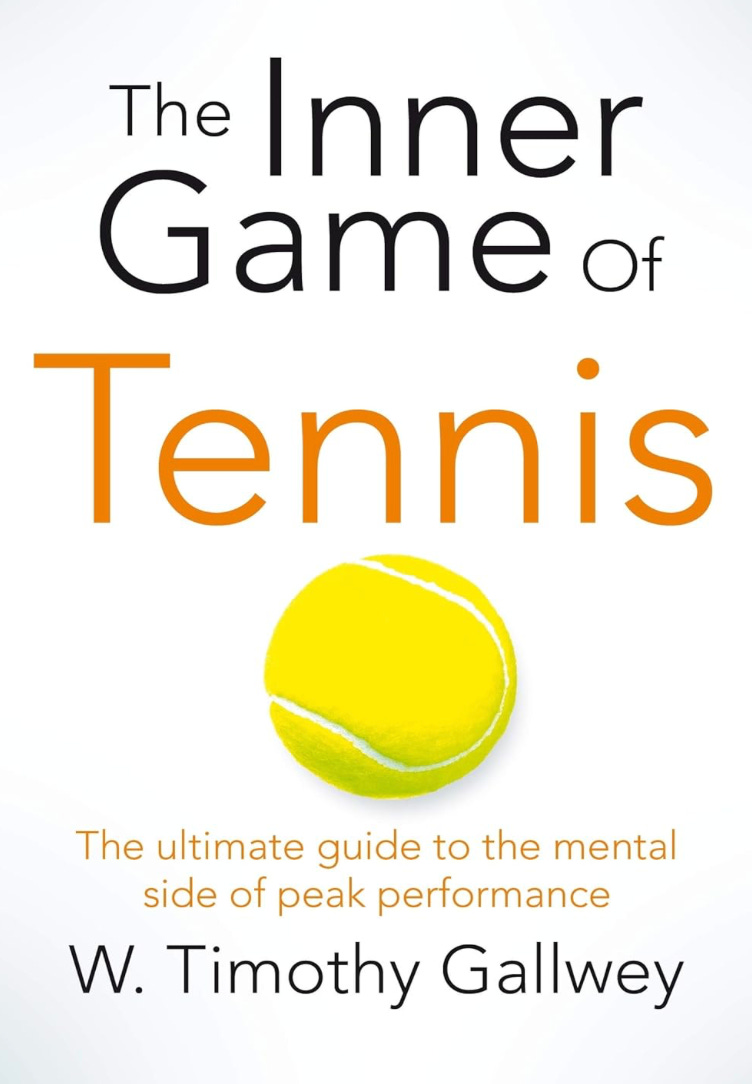Book Review: The Inner Game of Tennis by Timothy Gallwey
Performance = Potential - Interference
Title: The Inner Game of Tennis. The Ultimate Guide to the Mental Side of Peak Performance
Author: Timothy Gallwey
Year: 1974
In short
Self 1 is the ego-mind that interferes through thinking and trying too hard with the natural capacity & potential of Self 2 which already knows what to do or can naturally pick up what it does not
Quietening Self 1 so that Self 2 can do its job is what leads to high performance - and enjoyment. We quieten Self by letting go of judgment, trusting Self 2, and focusing awareness not on the show but on the result
Performance formula: performance = potential - interference
We always play an inner and outer game; most of us, pay too much attention to the outer game and too little to the inner game
Winning the inner game is about overcoming the inner obstacles in the pursuit of a goal that is worthy while tapping into and realizing one's full potential
Summary
"Neither mastery nor satisfaction can be found in the playing of any game without giving some attention to the relatively neglected skills of the inner game. This is the game that takes place in the mind of the player, and it is played against such obstacles as lapses in concentration, nervousness, self-doubt, and self-condemnation. In short, it is played to overcome all habits of mind which inhibit excellence in performance." (xvii)
Effortless concentration: still mind without interference from thoughts (such as how to swing a racket)
Gallwey notices that tennis players talk to themselves, there is an 'I' - Self 1 - that is telling the 'myself' - Self 2 how good or bad they are playing. Self 1 tells and Self 2 does. The secret to good tennis and good anything is to improve the relationship between Self 1 and Self 2.
Self 1 gets in the way of Self 2 with too much thinking, too much trying. When you are 'in the zone' (link to Flow), you do without need to think too much about it. You are childlike.
How to quieten the mind / Self 1?
Let go of judgments, both negative & positive; why? because "it is the initial act of judgment that provokes a thinking process" that interferes; instead, make observations - point to what you are seeing to draw attention to it without obsessively thinking about it; a positive judgment is criticism in disguise - by
establishing the 'good', it also establishes the 'bad'Trust self 2: humility of the natural intelligence/potential of that part of yourself that knows how to do things without putting them into words/thoughts, and can learn naturally what it does not know; let it happen
Focus: don't overthink the how, focus on the result (imagine where you want to be)
We are conditioned as children for Self 1 to emerge that judges our worthiness by what we are doing, by our performance. If this is not balanced by unconditional love, then you have a human drive to succeed in the false belief that they will thus obtain love and self-respect.
We play a game to win. Winning does not mean you are better or the other is worse. It means you have met the competition with a fuller use of your capacity. The competition allows you to stretch yourself and become more fully who you are in potential. In that, competition is a friend, not an enemy.
We play multiple games on the playing field. Gallwey realized that for him, the game worth playing was the Inner Game. He wanted to quieten Self 1 so that Self 2 could do its thing so that he could tap into his full potential by coming up against and being driven to surmount the competition.
Winning is overcoming obstacles to reach a goal, but the value in winning is only as great as the value of the goal reached. Reaching the goal itself may not be as valuable as the experience that can come with making a supreme effort to overcome the obstacles involved. The process can be more rewarding than the victory itself. (120)
For the player of the Inner Game, it is the moment-by-moment effort to let go and to stay centered in the here-and-now action which offers the real winning and losing, and this game never ends. (123)
This is not me-ism. It is a process of self-discovery that naturally makes its own contribution to the whole as we learn to make the basic contribution to ourselves. (134)



